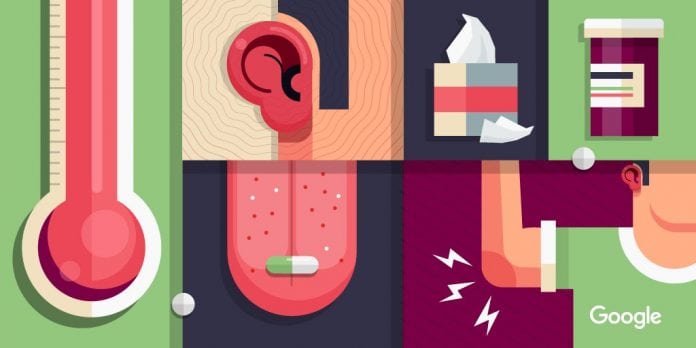
Picture this: you woke up today with a headache. It’s been getting worse all day, and you aren’t sure if you should be worried or not. So you open the Google app and start searching for your symptoms. After 20 minutes digging through health forums, chances are you’re overwhelmed by all the complicated medical terms and breaking out in a sweat—whether that’s related to the headache or the overdose of info is unclear!
You’re not alone. Roughly 1 percent of searches on Google (think: millions!) are symptom-related. But health content on the web can be difficult to navigate, and tends to lead people from mild symptoms to scary and unlikely conditions, which can cause unnecessary anxiety and stress.
So starting in the coming days, when you ask Google about symptoms like “headache on one side,” Google will show you a list of related conditions (“headache,” “migraine,” “tension headache,” “cluster headache,” “sinusitis,” and “common cold”). For individual symptoms like “headache,” it will also give you an overview description along with information on self-treatment options and what might warrant a doctor’s visit. By doing this, Google’s goal is to help you to navigate and explore health conditions related to your symptoms, and quickly get to the point where you can do more in-depth research on the web or talk to a health professional.
Google has created the list of symptoms by looking for health conditions mentioned in web results, and then checking them against high-quality medical information collected from doctors for the Knowledge Graph. Google worked with a team of medical doctors to carefully review the individual symptom information, and experts at Harvard Medical School and Mayo Clinic evaluated related conditions for a representative sample of searches to help improve the lists we show.
That said, symptom search (like all medical information on Google) is intended for informational purposes only, and you should always consult a doctor for medical advice. The answers rely on search results and reflect what’s on the web. Because of this, your feedback is especially important; google will use it to keep improving the results.
Google is rolling this update out on mobile over the next few days, in English in the U.S. to start. Over time, it will cover more symptoms and it will be available in languages, and internationally. So the next time you’re worried about your “child with knee pain” (even though it’s probably just growing pains), or have some symptoms you’re too embarrassed to run by your roommate, a Google search will be a helpful place to start.






































